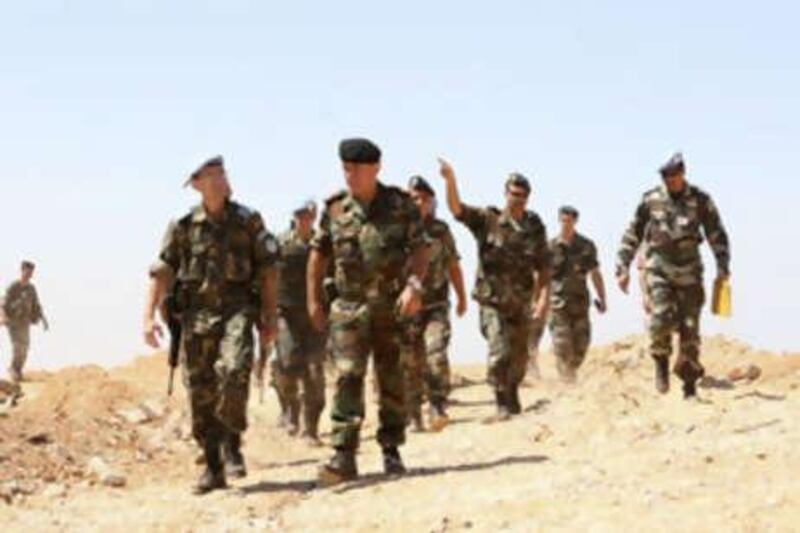BEIRUT // Lebanon has generally welcomed the announcement that Beirut and Damascus will establish formal diplomatic relations for the first time, but many Lebanese yesterday remained sceptical that any rapprochement will change the way Syria deals with its tiny neighbour. The announcement by Lebanon's president, MIchel Suleiman, and his Syrian counterpart, Bashar Assad, after a landmark meeting on the sidelines of the Mediterranean summit in Paris on Sunday was greeted with scepticism that it will make any difference and questioning by others as to why two "sisterly" countries need diplomatic relations at all.
"It is not true that confidence has been established with the declaration of intentions to set up diplomatic ties," said Fares Soaid, co-ordinator for the anti-Syrian March 14 parliamentary bloc. He said "correcting relations with Syria requires more than just setting up diplomatic ties". Walid Muallem, the Syrian foreign minister, is expected in Beirut soon to hand over formally an invitation to Michel Suleiman, the Lebanese president, to visit Damascus, an act that will help further cement the spirit of rapprochement between the two countries after years of tension.
But an exchange of embassies still leaves numerous other outstanding issues to be resolved. The most pressing demand of anti-Syrian Lebanese politicians is the demarcation of Lebanon's border with Syria. The border was drawn up by French military geographers in 1920 and generally follows the peaks of the Anti-Lebanon mountain chain. But its path has never been clearly marked on the ground with border pillars, giving rise to numerous local disputes between Syrian and Lebanese landowners.
A report put out by an anti-Syrian advocacy group last year claimed that Syria still occupies at least 460sq km of Lebanese territory along the border. The remote border also is home to Hizbollah training areas and several bases belonging to pro-Damascus Palestinian groups. It is regarded as a major conduit for the flow of weapons and militants into Lebanon. The United Nations has repeatedly called for the demarcation of the border, principally because it will help resolve the sovereignty of the Israeli-occupied Shebaa Farms, which lies along Lebanon's south-east border with the Syrian Golan Heights.
Syria has said it is willing to demarcate the border, but insists that the process begin in the north near the Mediterranean coast, leaving the Shebaa Farms district until last. A summit of French, Syrian, Lebanese and Qatari leaders in Paris on Saturday side-stepped the subject of border demarcation, apparently unwilling to dampen the glow of the announcement over a diplomatic exchange between Beirut and Damascus.
"This is a very big issue. The thing that holds the Syrian regime politically to Lebanon is the border issue because it involves Shebaa and thus the conflict with Israel," said Andrew Tabler, a Beirut-based political analyst focussing on Syria. The promised diplomatic exchange is a "step in the right direction", Mr Tabler said, "but until the border issue is resolved, it will be hard to move on fully".
Indeed, some analysts suspect that Syria's agreeing to a diplomatic exchange with Lebanon is more related to currying favour with France and Europe and deflecting potential threats to the regime rather than changing the way it traditionally exerts influence in Lebanon. Walid Jumblatt, leader of Lebanon's Druze and a harsh critic of the Syrian regime, warned that diplomatic ties can not come at the expense of the international tribunal being established to judge the accused killers of Rafik Hariri, a former Lebanese prime minister who was assassinated in Feb 2005. Syria is the chief suspect in the killing, although Damascus has denied involvement."Normal relations between Lebanon and Syria can be established after the truth is revealed," Mr Jumblatt said, referring to Hariri's murder.
The tribunal has yet to begin operating, although the United Nations authorised its establishment more than a year ago. Some anti-Syrian Lebanese suspect that the tribunal is being used by the West as a bargaining chip, allowing it to be dropped or weakened if Syria moderates some of its regional stances. Lebanon and Syria have never exchanged embassies even though both countries gained independence from France in the 1940s.
Syria traditionally has had difficulty in recognising Lebanon's independence, believing that Lebanon is an integral part of the Syrian "motherland". That view hardened with the rise to power in 1963 of the Baath Party, which proposes a Greater Syria that includes Lebanon as well as Israel, Jordan, Iraq, Kuwait and Cyprus. Syria continues to exert strong influence in Lebanon through its extensive network of allies, ranging from traditional political bosses to powerful parties such as Hizbollah. But some in Lebanon believe that formal diplomatic ties are unnecessary between two nations so closely related.
"Is it not silly to have diplomatic relations between Lebanon and Syria?" said Sheikh Ahmad Qabalan, the Shiite mufti. "Since when do brothers need mediation to deal with each other? And who said that relatives need diplomatic relations?" @Email:nblanford@thenational.ae





